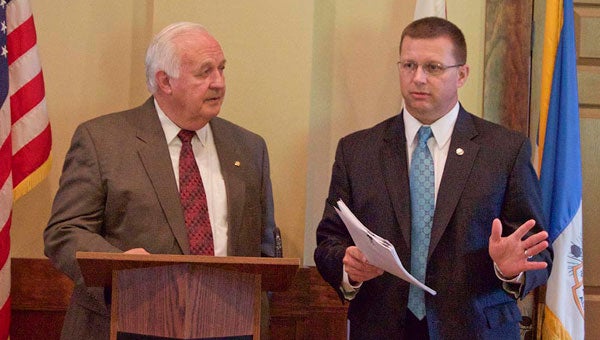No consensus for state budget solution
Published 12:35 am Wednesday, July 29, 2015
It’s time for the legislature to do a long-term fix for funding woes, but what that fix will be is still unclear, Covington County’s state senator and state representative told a crowd at the Andalusia Area Chamber of Commerce Tuesday.
Rep. Mike Jones and Sen. Jimmy Holley spoke to about 50 people in what was billed as a legislative update. Jones reviewed the highlights of the most recent regular session, but Holley went straight to the state’s General Fund budget problems.
Since 2008, he explained, the state has relied on federal stimulus money, loans from its oil reserve accounts, and monies from the highway trust fund, and two other savings accounts, to balance the state’s general fund budget.
“There is no more one-tie money,” he said. “We’re looking for a long-term fix.”
Neither Holley nor Jones voted for the General Fund budget passed in the regular session, but eventually vetoed by Gov. Robert Bentley.
“That budget included $193 million of conditional money,” Holley said. “Nobody in their right mind would have ever contemplated the money actually be there. It was just ink on paper. In addition to that, various state agencies were cut.”
The vetoed budget was $200 million less than the current operating budget. That cut, plus the conditional money used to balance it, spelled huge cuts for state agencies, Holley said.
“The overall cut to balance it without those conditionals would be about 9.5 percent across the board to every state agency,” Holley said. “It didn’t balance and it didn’t make sense to do this.”
Gov. Robert Bentley has proposed a package of bills with which to balance the budget, and legislators are working on their own plans.
“There is a good, hard look at transferring from the use tax, which is a use tax, which is growing and presently goes to the Education Tax Fund,” Holley said.
The tax generates $200 million per year, he said, and one proposal would move about $20 million to the General Fund.
“We’re also looking at several other areas, and concentrating on cigarette tax and the business privilege tax,” he said. “Now, much of our major corporations – like Walmart – pay, I’m told $12,000 a year in business privilege tax. That proposal would raise that amount to $25,000 per year. It wouldn’t affect smaller companies, and would raise about $40 million.”
Another proposal from Bentley, Jones and Holley said, would eliminate the state income tax deduction for the Social Security tax. This would generate an estimated $182 million. Bentley has said the measure would cause taxpayers to pay, at the most, $276 more in income taxes.
Gambling legislation also has been proposed, but both agreed that it would likely be 2018 before the state would see a return on gaming.
Pushed by those in the crowd to address cuts as opposed to imposing new taxes, Holley said, “We’ve done a miserable job in the legislature of letting voters know what we’ve done in the past few years.
“We cut 5,000 employees off the payroll of the state,” he said. “We’ve cut expenses in budgets, in and around a billion dollars. Then we come to a point where there’s no more one-time money; no more silver bullets. There have been substantial cuts in personnel and budgets.”
Continuing to cut will leave more problems, Holley said, with the possible challenge of not having employees to implement reforms.
Jones used the judiciary as an example.
“If we cut even 3 percent or 5 percent, doors to the courthouse might shut,” he said. “If we shut the doors, we’re shutting off the bank. That’s just a cut to the cash flow of the state.”
Holley reminded those gathered that while governments aren’t perfect, they do go things.
“We’ll always have some warts,” he said. “But we’ve got one of the best junior colleges in the state. We’ve got two county school systems that are excellent. The local system is excellent. There are a lot of things to be thankful for.
“We usually get more than we need,” he said. “We are blessed in so many ways. State government at its best is not perfect, but we are genuinely interested in a being a better state and a better community to live in.”
Both Holley and Jones noted that if the General Fund had been approved as passed, it would not have funded a comprehensive prison reform package, which Jones shepherded through the House.
“It would have been like turning on a big spotlight if we had shut down two prisons with that budget came thru,” Jones said, adding that doing so would have put the state system at more than 200 percent capacity. “The federal government would not come in and give a nice warning. It would have cost us hundreds of millions of dollars.”
The Special Session resumes on Monday.






